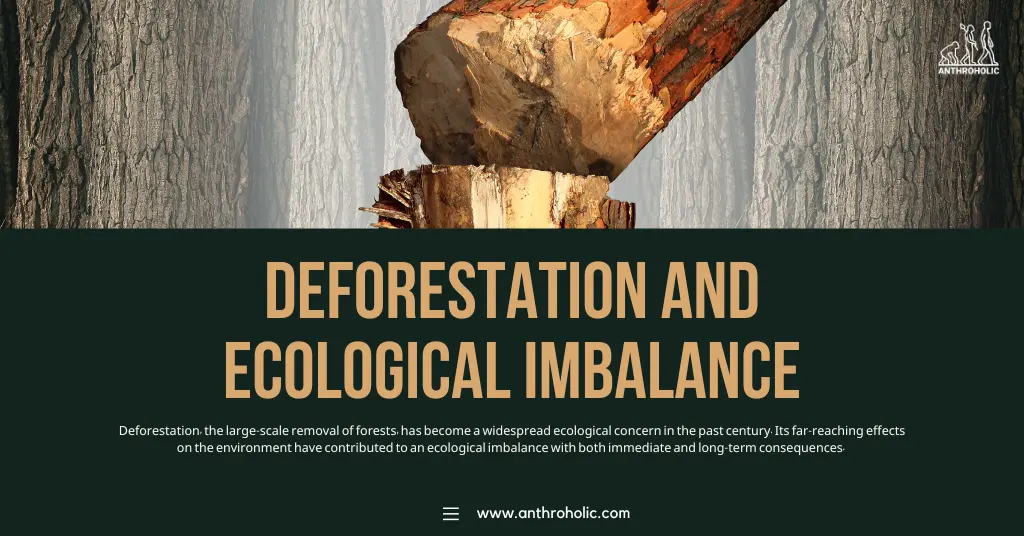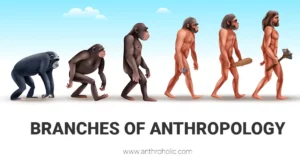AI Answer Evaluation Platform Live Now. Try Free Answer Evaluation Now
Deforestation and Ecological Imbalance
Deforestation, the large-scale removal of forests, has become a widespread ecological concern in the past century. Its far-reaching effects on the environment have contributed to an ecological imbalance with both immediate and long-term consequences.

Causes of Deforestation
Agricultural Expansion
The drive to expand agricultural lands has led to significant deforestation. Crop cultivation and grazing lands have replaced large forest areas, especially in the developing world [1].
Table 1: Top 5 Countries by Deforested Area (2000-2020)
| Country | Deforested Area (sq km) |
|---|---|
| Brazil | 250,000 |
| Indonesia | 150,000 |
| Russia | 120,000 |
| USA | 100,000 |
| China | 90,000 |
Logging
Industrial logging for timber and paper production is another leading cause. Though sustainable logging practices exist, illegal logging and unregulated exploitation have resulted in significant forest loss [2].
Infrastructure Development
Large-scale infrastructure projects like dams, roads, and urban expansion have also contributed to deforestation. Such developments often require clearing significant forested areas, further exacerbating ecological imbalances [3].
Impact of Deforestation
- Loss of Biodiversity: Deforestation has led to the extinction and endangerment of numerous species. As habitats are destroyed, flora and fauna lose their homes, causing a decline in biodiversity [4].
- Climate Change: Forests act as carbon sinks, absorbing CO2 emissions. Their removal has contributed to global climate change by increasing the concentration of greenhouse gases in the atmosphere.
- Soil Erosion: With the loss of tree cover, soil becomes more susceptible to erosion. This loss of fertile soil affects agricultural productivity and can lead to desertification in severe cases.
- Water Cycle Disruption: Forests play a vital role in maintaining the water cycle. Deforestation disrupts this balance, leading to changes in precipitation patterns and increased occurrence of floods and droughts.
- Social and Economic Impact: Deforestation has social and economic impacts, affecting livelihoods dependent on forests, and leading to conflicts over land use and resource allocation.
The Local Impact of Deforestation
- Community Displacement: Deforestation has often led to the displacement of indigenous and local communities whose lives are intricately tied to the forests. This disruption of traditional lifestyles can lead to poverty and loss of cultural identity.
- Health Implications: The destruction of forests also affects human health, increasing exposure to diseases such as malaria, and diminishing the availability of medicinal plants that many communities rely on.
Case Studies on Deforestation
Amazon Rainforest, Brazil
The Amazon Rainforest has seen significant deforestation due to cattle ranching, soy production, and illegal logging. This has led to the endangerment of numerous species and contributed to global climate change.
Borneo, Indonesia and Malaysia
Deforestation in Borneo, driven by palm oil production, has had severe impacts on orangutan populations and contributed to the loss of peatlands, which are essential carbon sinks.
Economic Perspectives
Short-term Gains and Long-term Losses
While deforestation may provide immediate economic benefits through agriculture and logging, the long-term environmental costs often outweigh these gains. The loss of ecosystem services and biodiversity can lead to more profound economic losses over time.
Sustainable Alternatives
Investing in sustainable forest management, agroforestry, and reforestation can provide economic benefits while preserving ecological balance. These practices are gradually gaining traction but require significant policy support and public awareness.
Cultural Perspectives
Cultural Connections to Forests
Many indigenous and local communities hold deep cultural connections to forests. Deforestation often represents not just a loss of resources but a profound cultural loss. Understanding and respecting these connections is vital in developing effective conservation strategies.
Indigenous Knowledge and Practices
Indigenous knowledge and practices often embody sustainable interaction with forests. Recognizing and integrating these practices can contribute to effective and culturally sensitive approaches to forest conservation.
Global Responses and Solutions
- Legal Regulations: Governments and international bodies have implemented laws and regulations to control deforestation. Strategies include the promotion of sustainable forest management and restrictions on illegal logging.
- Conservation Efforts: Various NGOs and community-based organizations are actively involved in conservation efforts. These include reforestation projects, awareness campaigns, and collaboration with governments to ensure sustainable practices.
- Technological Innovation: Technological advancements have enabled better monitoring of deforestation. Satellite imagery and GIS technology allow tracking and management of forest resources, facilitating informed decisions and interventions.
Conclusion
Deforestation presents a complex and multifaceted challenge. Its causes are interwoven with economic, social, and political factors, while its impacts are ecological, climatic, and societal. Addressing deforestation requires a concerted global effort, embracing legal, technological, and community-based solutions.
References
[1] FAO. (2020). “Global Forest Resources Assessment 2020.” Rome. https://www.fao.org/3/ca9825en/ca9825en.pdf
[2] Greenpeace. (2018). “Logging and the law: How the U.S. Lacey Act helps reduce illegal logging in the tropics.” Washington, D.C.
[3] World Bank. (2020). “Infrastructure development and deforestation.” Washington, D.C.
[4] Wilson, E.O. (1992). “The Diversity of Life.” Cambridge: Belknap Press.




